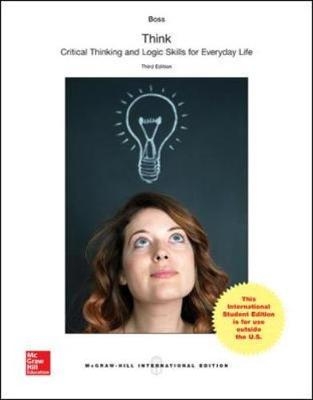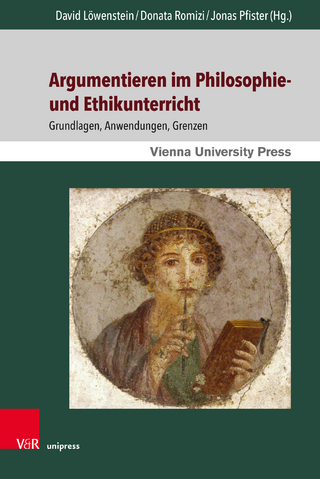
Think (Int'l Ed)
McGraw-Hill Education (Verlag)
978-1-259-25167-2 (ISBN)
- Titel ist leider vergriffen;
keine Neuauflage - Artikel merken
THiNK offers instructors core content and pedagogy in a succinct magazine format that teaches them the importance of overcoming feelings and opinions to commit to positions based on reason and logic. Boss’s 3rd edition is powered by Connect Critical Thinking, a state of the art digital learning environment that helps you connect your students to their coursework. Whether accessing online homework and quizzes, or assigning SmartBook and LearnSmart, the first and only adaptive learning experience, Connect provides a complete digital solution for your classroom. With extensive opportunity for application and practice, and groundbreaking digital content, THiNK directs students to make connections between skill development and apply it to their college studies, careers, and personal lives.
Judith A. Boss earned her PhD in 1990 from Boston University, her MA from Dalhousie University in Canada in 1971, and her BA from the University of Western Australia in 1969. Prior to pursing a career in academia, she worked as a writer/researcher for the Nova Scotia Museum. She was on the faculty of the Department of Philosophy at the University of Rhode Island from 1988 to 1995 and worked as Assistant Director of Curriculum Affairs at Brown University School of Medicine until 2004, when she "retired" to return to full-time writing. She remained at Brown University as a visiting scholar with the philosophy department for several years while working on her textbooks. In addition to her philosophical interests, she completed a MS in Human Development at URI in 1991 and has led faculty workshops and written extensively on the topic of college student development. She was recipient of a URI Foundation Grant to study the effects of community service learning on students' moral development and has served as a grant application reviewer for the Corporation for National Service. The author of nine books, her publications include ANALYZING MORAL ISSUES and ETHICS FOR LIFE, both with McGraw-Hill. Her textbook THiNK, also with McGraw-Hill, just came out in 2009. She is published in, among other, The Journal of Moral Education, Public Affairs Quarterly, The Journal of Medical Ethics, Academic Medicine, Educational Theory, Free Inquiry, and The Journal of Experiential Education. During her spare time she volunteers with the U.S. Fish and Wildlife Services and is active in the Appalachian Mountain Club. An avid traveler, she has traveled with students from the University of Rhode Island and Brown Medical School to work with underserved, indigenous people in Guatemala and Mexico. Her favorite travel destination, however, is Antarctica, and Blue Ice, a suspense/thriller she wrote that is set in Antarctica, is coming out in print next year. She lives in Rhode Island with her daughter, son-in-law and twin granddaughters.
Chapter 1: Critical Thinking: Why It's Important What is Critical Thinking? Critical Thinking in Everyday Life Cognitive Development in College Students Characteristics of a Good Critical Thinker Analytical Skills Effective Communication Research and Inquiry Skills Flexibility and Tolerance for Ambiguity Open-minded Skepticism Creative Problem Solving Attention, Mindfulness, and Curiosity Collaborative Learning Critical Thinking and Self-Development Living the Self-Examined Life Developing a Rational Life Plan Facing Challenges The Importance of Self-Esteem Critical Thinking in a Democracy Barriers to Critical Thinking The Three-Tier Model of Thinking Resistance Types of Resistance Narrow-mindedness Rationalization and Doublethink Cognitive and Social Dissonance Stress as a Barrier Critical Thinking Issue: Perspectives on Affirmative Action in College Admissions Chapter 2: Reason and Emotion What is Reason? Traditional Views of Reason Gender, Age, and Reason Dreams and Problem Solving The Role of Emotion in Critical Thinking Cultural Attitudes Toward Emotion Emotional Intelligence and the Positive Effects of Emotion Negative Effects of Emotion Integrating Emotion and Reason Artificial Intelligence, Reason, and Emotion The Field of Artificial Intelligence Can Computers Think? Can Computers Feel Emotion? Faith and Reason Fideism: Faith Transcends Reason Rationalism: Religious Beliefs and Reason Critical Rationalism: Faith and Reason are Compatible Religion, Spirituality and Real-Life Decisions Critical Thinking Issue: Perspectives on on Reason and Proofs for the Existence of God Chapter 3: Language and Communication What is Language? Functions of Language Nonverbal Language Definitions Denotative and Connotative Meanings Stipulative Definitions Lexical Definitions Precising Definitions Persuasive Definitions Evaluating Definitions Five Criteria Verbal Disputes Based on Ambiguous Definitions Communication Styles Individual Styles of Communication Sex and Racial Differences in Communication Style Cultural Differences in Communication Styles The Use of Language to Manipulate Emotive Language Rhetorical Devices Deception and Lying Critical Thinking Issue: Perspectives on Free Speech Zones on College Campuses Chapter 4: Knowledge, Evidence and Errors in Thinking Human Knowledge and Its Limitations Rationalism and Empiricism The Structure of the Mind Evaluating Evidence Direct Experience and False Memories The Unreliability of Hearsay and Anecdotal Evidence Experts and Credibility Evaluating Evidence for a Claim Research Resources Cognitive and Perceptual Errors in Thinking Perceptual Errors Misperception of Random Data Memorable Events Error Probability Error Self-Serving Biases Self-Fulfilling Prophecies Social Errors and Biases "One of Us/One of Them" Error Societal Expectations Group Pressure and Conformity Diffusion of Responsibility Critical Thinking Issue: Perspectives on Evaluating Existence for the Existence of Unidentified Flying Objects Chapter 5: Informal Fallacies What is a Fallacy? Fallacies of Ambiguity Equivocation Amphiboly Fallacy of Accent Fallacy of Division Fallacy of Composition Fallacies of Relevance Personal Attack (Ad Hominem) Fallacy Appeal to Force (Scare Tactics) Appeal to Pity Popular Appeal Appeal to Ignorance Hasty Generalization Straw Man Red Herring Fallacies Involving Unwarranted Assumptions Begging the Question Inappropriate Appeal to Authority Loaded Question False Dilemma Questionable Cause Slippery Slope Naturalistic Fallacy Strategies for Avoiding Fallacies Critical Thinking Issues: Perspectives on Gun Control Chapter 6: Recognizing, Analyzing, and Constructing Arguments What is an Issue? Identifying an Issue Asking the Right Questions Recognizing an Argument Distinguishing Between Argumentation and Rhetoric Types of Arguments Propositions Premises and Conclusions Nonarguments: Explanations and Conditional Statements Breaking Down and Diagramming Arguments Breaking Down an Argument into Propositions Identifying the Premise(s) and Conclusion in Complex Arguments Diagramming an Argument Evaluating Arguments Clarity: Is the Argument Clear and Unambiguous? Credibility: Are The Premises Supported by Evidence? Relevance: Are The Premises Relevant to the Conclusion? Completeness: Are There Any Unstated Premises and Conclusions? Soundness: Are the Premises True and Do They Support the Conclusion? Constructing an Argument Steps for Constructing an Argument Using Arguments in Making Real-Life Decisions Critical Thinking Issue: Perspectives on Same Sex Marriage Chapter 7: Inductive Arguments What is an Inductive Argument? The Use of Inductive Reasoning in Everyday Life Generalization Using Polls, Surveys, and Sampling to Make Generalizations Applying Generalizations to Particular Cases Evaluating Inductive Arguments Using Generalization Analogies Uses of Analogies Arguments Based on Analogies Analogies as Tools for Refuting Arguments Evaluating Inductive Arguments Based on Analogies Causal Arguments Causal Relationships Correlations Establishing Causal Relationships Causal Arguments in Public Policy and Everyday Decision Making Evaluating Causal Arguments Critical Thinking Issue: Perspectives on Legalizing Marijuana Chapter 8: Deductive Arguments What is a Deductive Argument? Deductive Reasoning and Syllogisms Valid and Invalid Arguments Sound and Unsound Arguments Types of Deductive Arguments Arguments by Elimination Arguments Based on Mathematics Arguments from Definition Hypothetical Syllogisms Modus Ponens Modus Tollens Chain Arguments Evaluating Hypothetical Syllogisms for Validity Categorical Syllogisms Standard-Form Categorical Syllogisms Quantity and Quality Diagramming Propositions with Venn Diagrams Using Venn Diagrams to Evaluate Categorical Syllogisms Translating Ordinary Arguments into Standard Form Rewriting Everyday Propositions in Standard-Form Identifying the Three Terms in the Argument Putting the Argument in Standard Form Critical Thinking Issue: Perspectives on the Death Penalty Chapter 9: Critical Thinking in Ethics and Moral Decision-Making What is Moral Reasoning? Moral Values and Happiness Conscience and Moral Sentiment br> The Development of Moral Reasoning Lawrence Kohlberg's Stage Theory of Moral Development Carol Gilligan on Moral Reasoning Women The Development of Moral Reasoning in College Students Moral Theories: Morality is Relative Ethical Subjectivism Cultural Relativism Moral Theories: Morality is Universal Utilitarianism (Consequence-Based Ethics) Deontology (Duty-Based Ethics) Rights-Based ethics Virtue Ethics Moral Arguments Recognizing Moral Arguments Constructing Moral Arguments Evaluating Moral Arguments Resolving Moral Dilemmas Critical Thinking Issue: Perspectives on Abortion Chapter 10: Marketing and Advertising Marketing in a Consumer Culture Marketing Research Avoiding Confirmation Bias and Other Errors in Thinking Marketing Strategies The SWOT Model Consumer Awareness of Marketing Strategies Advertising and the Media The Role of Advertising in the Media Product Placement Television Advertising and Children Evaluating Advertisements Common Fallacies in Advertisements Rhetorical Devices and Misleading Language Faulty and Weak Arguments A Critique of Advertising Critical Thinking Issue: Perspectives on Advertising and Children Chapter 11: Mass Media Mass Media in the United States The Rise of Mass Media The Media Today The News Media Sensationalism and the News as Entertainment Depth of News Analysis Bias in the News Science Reporting Misrepresentation of Scientific Findings Government Influence and Bias Evaluating Scientific Reports The Internet Impact of the Internet on Daily Life Social Networking The Internet as "The Great Equalizer" Misuse of the Internet: Pornography and Plagiarism Media Literacy: A Critical Thinking Approach Experiencing the Media Interpreting Media Messages Critical Thinking Issue: Internet Plagiarism Among College Students Chapter 12: Science What is Science? The Scientific Revolution Assumptions Underlying Science Limitations of Science Science and Religion The Scientific Method 1. Identify the Problem 2. Develop an Initial Hypothesis 3. Gather Additional Information and Refine the Hypothesis 4. Test the Hypothesis 5. Evaluate the Hypothesis Based on Testing or Experimental Results Evaluating Scientific Hypotheses Relevance to the Problem Under Study Consistency with Well-Established Theories Simplicity Testability and Falsifiability Predictive Power Distinguishing Between Scientific and Pseudoscientific Hypotheses Research Methodology and Scientific Experiment s Research Methodology and Design Field Experiments Controlled Experiments Single Group (Pretest-Posttest) Experiments Evaluating an Experimental Design Interpreting Experimental Results Ethical Concerns in Scientific Experimentation Thomas Kuhn and Scientific Paradigms Normal Science and Paradigms Scientific Revolutions and Paradigm Shifts Critical Thinking Issue: Evolution versus Intelligent Design Chapter 13: Law and Politics The Social Contract Theory of Government The State of Nature Social Contract Theory International Law The Development of Democracy in the United States Representative Democracy: A Safeguard against the "Tyranny of the Majority" Liberal Democracy: Protection of Individual Rights Political Campaigns and Elections Voting: A Right or a Duty? The Executive Branch of Government The Role of the Executive Branch Executive Orders and National Security Checks on Executive Power The Legislative Branch of Government The Role of the Legislative Branch Citizens and Legislation Unjust Laws and Civil Disobedience The Judicial Branch of Government The Role of the Judicial Branch Rules of Evidence Legal Reasoning and the Doctrine of Legal Precedent Jury Duty Critical Thinking Issue: Perspectives on the Use of Drones in Warfare Solutions Manual Glossary Notes Credits Index
| Verlagsort | OH |
|---|---|
| Sprache | englisch |
| Maße | 216 x 277 mm |
| Gewicht | 819 g |
| Themenwelt | Geisteswissenschaften ► Philosophie ► Logik |
| ISBN-10 | 1-259-25167-5 / 1259251675 |
| ISBN-13 | 978-1-259-25167-2 / 9781259251672 |
| Zustand | Neuware |
| Haben Sie eine Frage zum Produkt? |
aus dem Bereich


